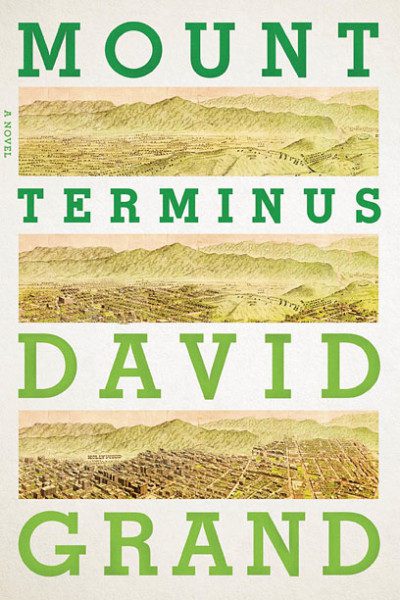 Mount Terminus is an allegorical novel that’s at its best when it’s not. At times, it reminded me of Marquez and the flow of magical realism. However, it’s not really magical realism in those phases but improbable realism. This is when I said to myself…hold on, people don’t behave this way…this story has more the tenor of folklore. Viewed that way, the novel makes aesthetic sense. Viewed realistically, it’s jarring. David Grand plays it both ways.
Mount Terminus is an allegorical novel that’s at its best when it’s not. At times, it reminded me of Marquez and the flow of magical realism. However, it’s not really magical realism in those phases but improbable realism. This is when I said to myself…hold on, people don’t behave this way…this story has more the tenor of folklore. Viewed that way, the novel makes aesthetic sense. Viewed realistically, it’s jarring. David Grand plays it both ways.
Take the opening with three orphan children…twin sisters Rachel and Leah and young Jacob, cast adrift on the East Coast of America. If, as a Three Guys reader, you’ve read the bible or more likely, Thomas Mann’s retelling in Joseph and His Brothers, you know that Rachel and Leah are not twins and that Jacob wants to marry Rachel, labors for her for seven years, but ends up with a bait and switch on his wedding night.
In David Grand’s variation, Jacob marries Rachel, but is tricked by Leah one evening and sleeps with her thinking she’s his wife. Rachel bears Joseph and Leah bears black sheep Simon, the two step brothers whose conflicted fraternity and rivalry are the central nexus of the narrative.
Does the main part of this story take place in L.A.? Most of the reviewers say that. And look at the cover of the novel. But I don’t believe the place name “Los Angeles” ever occurs in the story. Isn’t it odd that in a 350 plus page novel that takes place mostly in Los Angeles, no character names the town? It is L.A. but it also might as well be called Babel.
Last time I heard a recounting of the ancient cities of the bible, I don’t think Los Angeles was mentioned. But such is David Grand’s magnificently quirky imagination and cultivated prose style, he makes me think that Los Angeles should have been included in the sacred text.
The bereaved and broken Jacob, after the tragic demise of the twin sisters, the one he truly loved and the one whose trickery betrayed him, takes Joseph, mostly called Bloom in the story…short for Rosenblum…to his villa on Mount Terminus where he once lived with Rachel. Mount Terminus sort of reminded me of the hill in L.A. where the Hollywood sign is. I know my West Coast geography isn’t quite kosher but it will do for a New Yorker.
You have to imagine a lavish and eccentric Spanish villa high up a mountainside overlooking the vast grid-to-be of L.A. on one side. And on the other, a matrix of agricultural properties fed by a dam and aqueducts that annihilate the desert. The man-made enhancements/disfigurement of the terrain courtesy of Bloom’s brother Simon, a mythical founder of cities and film studios who makes Robert Moses seem like a planner who designed nothing more than miniature golf courses.
Bloom grows up in the villa on Mount Terminus, attended by servants Meralda and Roya who develop a devotion to the young man. Roya is mute but is capable of an eloquence that is expressed in non-verbal ways.
It’s a fine compliment to Grand’s storytelling skill that he makes the young Bloom seem worthy of the servants’ devotion. But I joked to myself during my reading, playing off the ying/yang of the story’s realism and folklore, that it’s remarkable that these two servants devote a lifetime to caring for Bloom and never ask for a raise.
The presence of the female servants, and the background story of the tragic twin sisters, does have the effect of relieving the mostly all-male tenor of the bulk of the story. If Mount Terminus was an opera, it would be one in which the soprano doesn’t make her appearance until the final act.
That grated on my personal taste, since I like to see autonomous women characters that live through their own voices. I didn’t quite get that until the end of the story but at that point I felt well satisfied.
What we have instead is a series of male-on-male mentoring relationships, starting with Bloom and his wounded father and moving through several other guiding friendships that Bloom has with older, more experienced guys. It’s typical of the way Grand thinks that it’s another of these male mentors who takes Bloom aside and tells him it’s time to have a serious relationship with a woman.
Oh, there’s so much more to the novel than this. I’m just mentioning some of the highlights that I found interesting. Mount Terminus packs an awesome amount of quality and depth into its 350 odd pages. It’s as if you got three pages of utter brilliance for every one page of print that you read. That’s the best possible bargain for the reader.
I was so surprised and shocked by David Grand’s talent and craft…so…I don’t believe he’s doing this…so…I don’t believe he could be that intelligent…that he could serve up so much precise metaphorical dissonance…that his prose style could be so beautiful. Out now, as you must know, from Farrar, Straus and Giroux. I read a galley offered by a book brother.







